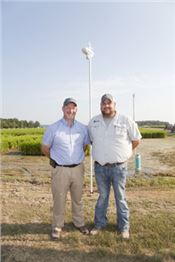|
Water Control

Whitney Blake, right, sales agronomist for RiceTec, and Monte Gilliland, representative for Aquarius Farm Control,
explained the automated irrigation system to tour goers on a tour stop.
Photo by John LaRose Jr.
Automated Irrigation System Eliminates Guesswork For Farmers
BETTY VALLE GEGG-NAEGER
MidAmerica Farmer Grower
HARRISBURG, ARK.
At an automated irrigation tour stop during RiceTec’s recent field day, Whitney Blake, sales agronomist for RiceTec, and Monte Gilliland, representative for Aquarius Farm Control, explained the system to tour goers.
“Our Smart Rice program has a goal of raising more rice using less inputs,” Blake said. “A tie-in to that is automating the watering of rice fields, whether it’s a row rice field or an alternate wetting and drying (AWD) field or a cascade levee field.”
“Last year we partnered with Aquarius to provide customers with the sensor technology and automation system to actually do this. The goal is to automate fields, to watch water levels in a flooded field, or moisture levels in a row rice field, tied together with the automation system on the well head that’s connected to the internet to pump water and turn the well on and off.”
Part of the initiative was studying irrigation practices and how they affect water usage. Next on the list is the planning on how a farmer waters his field, and after that, determine if the grower is using multiple inlet and the old fashioned or the common flooded system.
“Specifically, on the row rice system, to make it efficient you have to know when to water and that requires sensors,” Blake continued. “The same with AWD, you need to know when the optimum time to re-water that field after you dry it down. And just in general terms, with any flood environment you need to know when it needs water. The sensor technology allows that, and with that you can completely automate a field so that when the field needs water the system can automate the well function or alert you so that you can manually turn on the well. Therefore, if you’re watering effectively, and you’re not having runoff, you’re going to save water in the end.”
Many Universities, the NRCS, and RiceTec itself does a significant amount of research on this, and it’s all dependent on the farmer and how efficient they are striving to be.
“They’re saving time for not having to go to wells because they can monitor everything remotely,” Gilliland said. “They can see the flow data there, make sure they’re running, they can see moisture sensors, the data, to tell whether they’re achieving the goals they want to achieve. They’re also seeing their water levels in these rice fields to make sure they’re maintaining those levels to get the optimum growth and conditions for that rice. Through the pump controls we also log all that data, so they have all the information throughout the year. They can see what was going on at any point in time in their plant growth. We also log the moisture sensor data, the water level data and that all goes to the cloud so they can print out an easy report at the end of the year. They can also turn that in to any reporting or funding entities whether it’s USDA or NRCS or whoever they’re working with so they get the optimal data and can figure out how to do it better next year.”
Gilliland said Aquarius covers RiceTec’s whole area, all the way from the Bootheel of Missouri to the coastline.
“Wherever they are, they’re representing us and we’re backing them up with service,” he said. “We’re an electronics company, we’ve been in business since 1984 and we know the electronics, we know the machinery. They know the plant stages, they know the plant agronomy. It’s really a nice partnership. They know what we don’t know, and we can provide the service for the equipment and back it up by a company that’s been in business for 30 years, so it’s working out well. We’re looking forward to the future with it.”
Blake commented on RiceTec’s key values, especially citing the goal of innovation and how it affects his work.
“Innovation; this is just another step in the process,” he said, motioning to the rice field. “These technologies are in their infancy, there is not a huge adoption at this point, but we see it continuing to grow, just like any technology. That’s the innovative side of our sustainability goals here at RiceTec.”
Gilliland cited how teamwork affects his efforts.
“We’re working together, and care and respect means you’re taking care of the community and the fields better; and RiceTec is using the equipment here on their research farm. They can give us feedback, they’re in touch with the farmers, farmers can give them feedback, so it’s a great partnership,” he said.
Both agreed the take-home message is to encourage farmers to contact Aquarius or RiceTec with questions.
“If you’re interested in any of this, get in contact with your RiceTec representative or Monte or any other representatives. We have several demos out or come take a look at fields here at the station or off-station.” Blake said.
“We know that good equipment is great, but service is better,” Gilliland said. “We’re here for the long haul, we want to service this stuff and take care of the grower. That’s why we’re here.” ∆
BETTY VALLE GEGG-NAEGER: Senior Staff Writer, MidAmerica Farmer Grower
|
|